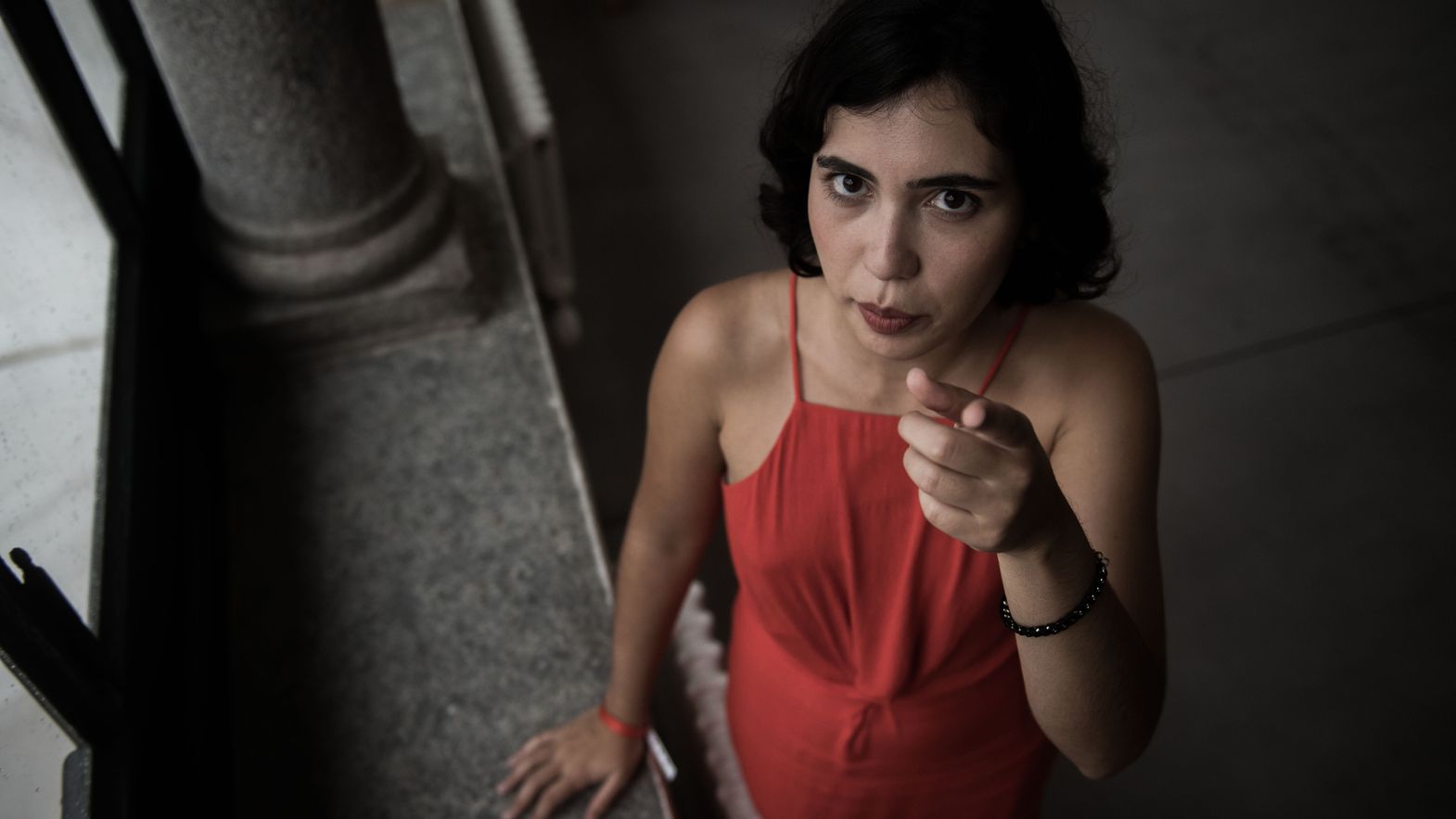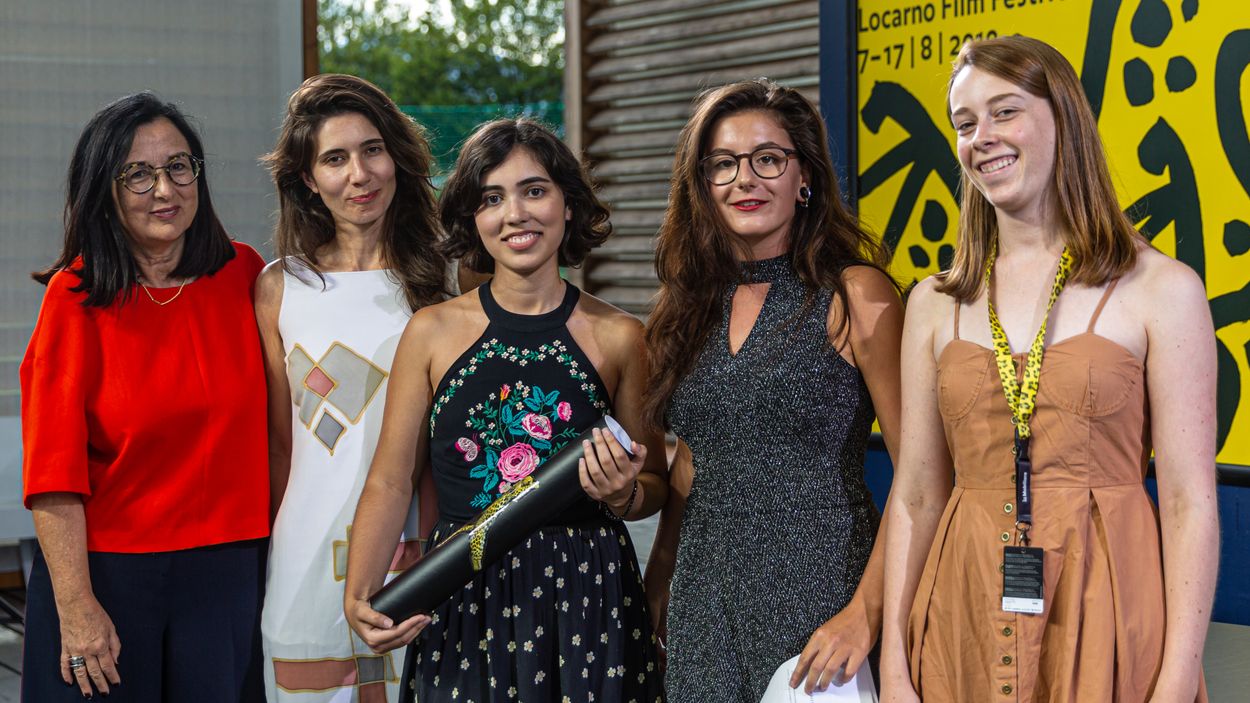Carne, by Camila Kater
 Camila Kater, Locarno 2019
Camila Kater, Locarno 2019
What does it mean, a year and a half later, to win a competition, however "small" it may be?
«I guess it means that Carne is still resonating with the audience. It's a great honor to me and to my team to win this award. Thank you, Locarno Film Festival, for this opportunity to show Carne once again, thank you to everyone who voted and thanks to my producers Chelo Loureiro and Lívia Perez and my wonderful team.»
Carne is a powerful film, straightforward, but - often - with gentle tones and traits. It tells the story of a strong, self-confident author. Is Camila like that?
«Thanks! I believe I've become, or I am becoming, that person. Carne definitely helped me to achieve self-confidence personally and professionally as well. I'm a short, soft-voiced 30-year old director and I look younger than I am, but don't judge a book by its cover… I’m fierce!»
What is your relationship with your body? Is this film dedicated to it, or to the female body in general?
«My relation with my body was really important to create Carne, but the film does not address my body specifically, but of course I can relate to some of the stories. I grew up with my mother and aunt who were often going through diets. There were plenty of fitness magazines at home and since I was 6, at least, I was very concerned about my body shape. I believe I learned a lot from all the women I interviewed in Carne. Even though I cannot assume I'm totally comfortable with my body today, I certainly respect and admire it more.»
I wouldn't define my cinema as female, although Carne definitely is. I think my cinema speaks about power. At least for now.
In your choice of images, you don't discount or censor anything. Did the technique you chose help you in this?
«The reason I chose animation in the first place was to protect the interviewees who would share very intimate and personal stories. Apart from that I'm an animator, so animation is how I express myself. Unfortunately women’s bodies are covered in taboos and we didn't want to reproduce the violence and censorship that surround us. We need to amplify the discussion on our bodies.»
Carne talks about "body shapes" and does so with different "forms" of film language (images, plasticine, painting...). What shape does your cinema take? In which one did you feel most comfortable?
«The form in my films is dictated by the subject, the themes. That's what happened in Carne. All the animation techniques of Carne are connected with the testimonies, via the senses. After I interviewed the first protagonist, Rachel Patrício, I decided that the film would be animated with 5 different techniques. I would animate the first segment over a dinner plate, as it was my blank canvas, using oil paint, real food and making a scary doll. I'm a craft maker, I love to sculpt, to paint, to draw and mainly to experiment with diverse materials. I was comfortable using stop-motion animation in the first segment and I invited 4 wonderful animators to join me and work on the following chapters of Carne: Giovana Affonso (watercolor), Flávia Godoy (2d digital), Cassandra Reis (natural clay) and Leila Monsegur (painting and scratching on 35mm film).»
Is your cinema female? Do you experience it as an expression of belonging?
«No, I wouldn't define my cinema as female, although Carne definitely is. I really enjoy telling stories that relate to my experiences, but not all of them are limited to my gender identity. I think my cinema speaks about power. At least for now.»
 Camila Kater with her producers Chelo Loureiro and Lívia Perez, and two representatives of the Youth Jury, Locarno 2019
Camila Kater with her producers Chelo Loureiro and Lívia Perez, and two representatives of the Youth Jury, Locarno 2019
Is there anything that cinema cannot or should not show? Is there a veil beyond which it must not dare?
«I think cinema is an marvelous art expression, but also a very powerful tool, often in the hands of rich, white, heterosexual, cisgender men. I think that making a film requires many responsibilities. In Carne, for example, we were dealing with real stories and real women, hard topics on personal and intersectional experiences. We had a great responsibility to carefully represent their stories in a respectful way.»
How do you remember your experience in Locarno? What do you remember about the first screening of Carne?
«My days in Locarno were wonderful! Watching great films in the Piazza Grande, and at La Sala; swimming in that perfect blue lake and seeing Carne for the first time on the big screen. It was like a dream! I will never forget how intense the reaction of the huge audience was during the first screening of Carne.»
What project are you working on now?
«I'm developing a Carne anthology series and two short films with Chelo Loureiro. With the Carne series, we are approaching more themes related to women's bodies on an international and multicultural scale, with interviewees and artists from Brazil, Spain, Palestine, Nigeria and China. I want to work again with diverse animation techniques and women animators, exploring sensorial associations between the testimonies and the plastic form of animation. The first short film I'm working on now is a stop-motion adaptation of a Spanish children's book called Yo Voy Conmigo about self-acceptance. The second short film is an animated comedy musical, which I will be directing alongside Samuel Mariani, related to my own experiences studying in a Catholic school when I was a child, when my biggest fear was Jesus Christ.»